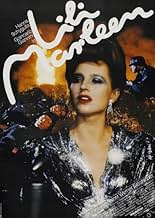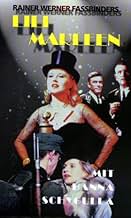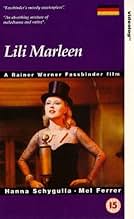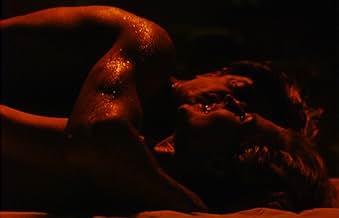VALUTAZIONE IMDb
7,1/10
4633
LA TUA VALUTAZIONE
Aggiungi una trama nella tua linguaIn 1938, a German singer falls in love with a Jewish composer in Zurich, who helps Jews flee Nazi Germany. She wants to help but is forced back to Germany. Her song "Lili Marleen" becomes a ... Leggi tuttoIn 1938, a German singer falls in love with a Jewish composer in Zurich, who helps Jews flee Nazi Germany. She wants to help but is forced back to Germany. Her song "Lili Marleen" becomes a hit with soldiers and the Nazi top brass.In 1938, a German singer falls in love with a Jewish composer in Zurich, who helps Jews flee Nazi Germany. She wants to help but is forced back to Germany. Her song "Lili Marleen" becomes a hit with soldiers and the Nazi top brass.
- Regia
- Sceneggiatura
- Star
- Premi
- 1 vittoria e 4 candidature totali
Karl-Heinz von Hassel
- Henkel
- (as Karl Heinz von Hassel)
Raúl Gimenez
- Blonsky
- (as Raul Giminez)
Recensioni in evidenza
Rainer Werner Fassbinder always made movies as if he knew his was on borrowed time. Many of the 44 films made by him in his 16-year career represent searches, experiments, attempts to express himself as an artist in the most diverse cinematic ways. 'Lili Marleen', made in 1981, the penultimate year of his life, belongs to a cluster of several films that are apparently less radical than most of the others and closer to mainstream cinema. After the success of some of his movies in previous years, Fassbinder was able to secure financing for more expensive productions with international casts and many extras. He chooses to make 'Lili Marleen', a story woven around the famous song that sounded in the trenches of the Second World War, both German and Allied (one of the famous versions belongs to Marlene Dietrich) and somewhat inspired by the autobiographical book of Lale Andersen, the German singer who first recorded the song on disc. Apparently, it is a melodrama that improbably embellishes her biography. In fact, we also find in this film the story of a woman who has to face alone the dark forces of the surrounding society combined with Fassbinder's sarcastic vision of the history of 20th century Germany.
The film's lead character, Willie, is a blonde, Aryan, German singer who doesn't seem to know or care much about what's going on in Germany in 1938. She performs in a cabaret in Zurich and falls in love with Robert, a wealthy young Jew, whose family is involved in the anti-Nazi resistance fight and in the rescue of the remaining Jews in Germany. Willie's father opposes the relationship and maneuvers so that the young woman cannot return to Switzerland after a trip to Germany. Forced to earn a living in Nazi Germany, Willie records the song 'Lili Marleen', which after the outbreak of war and the occupation of much of Europe and North Africa by the Nazis becomes a hit listened to by German soldiers and later by the Allies when they will disembark in Europe. The relationship between Willie and Robert continues, and the singer, forced to make artistic compromises and collaborate with the Nazis, begins to open her eyes and get involved in the fight against Nazism.
As in many of Fassbinder's films, the female characters are much stronger, more nuanced and better defined than the male characters. The lead role is interpreted by the exceptional Hanna Schygulla, Fassbinder's favorite actress. Her Willie is carefree at first, eager to live her life, a fighter for survival using her art and feminine charms as weapons. Above all, however, she is in love, but times of war crush destinies and love stories. Robert and his father are ambiguous characters and Fassbinder has been criticized for this, but also for nuancing the characters on the other side of the conflict, the Nazi officers. My opinion is that artistically the choice was appropriate, and the film must be seen from the director's sarcastic perspective, fascinated but also critical of the anti-cultural kitsch of 20th century Germany. As in many of his other films, Fassbinder also appears in a cameo role, as head of the anti-Nazi resistance, perhaps also to emphasize his personal position. 'Lili Marleen' is a film less appreciated by critics and Fassbinder experts. I consider it among his best films.
The film's lead character, Willie, is a blonde, Aryan, German singer who doesn't seem to know or care much about what's going on in Germany in 1938. She performs in a cabaret in Zurich and falls in love with Robert, a wealthy young Jew, whose family is involved in the anti-Nazi resistance fight and in the rescue of the remaining Jews in Germany. Willie's father opposes the relationship and maneuvers so that the young woman cannot return to Switzerland after a trip to Germany. Forced to earn a living in Nazi Germany, Willie records the song 'Lili Marleen', which after the outbreak of war and the occupation of much of Europe and North Africa by the Nazis becomes a hit listened to by German soldiers and later by the Allies when they will disembark in Europe. The relationship between Willie and Robert continues, and the singer, forced to make artistic compromises and collaborate with the Nazis, begins to open her eyes and get involved in the fight against Nazism.
As in many of Fassbinder's films, the female characters are much stronger, more nuanced and better defined than the male characters. The lead role is interpreted by the exceptional Hanna Schygulla, Fassbinder's favorite actress. Her Willie is carefree at first, eager to live her life, a fighter for survival using her art and feminine charms as weapons. Above all, however, she is in love, but times of war crush destinies and love stories. Robert and his father are ambiguous characters and Fassbinder has been criticized for this, but also for nuancing the characters on the other side of the conflict, the Nazi officers. My opinion is that artistically the choice was appropriate, and the film must be seen from the director's sarcastic perspective, fascinated but also critical of the anti-cultural kitsch of 20th century Germany. As in many of his other films, Fassbinder also appears in a cameo role, as head of the anti-Nazi resistance, perhaps also to emphasize his personal position. 'Lili Marleen' is a film less appreciated by critics and Fassbinder experts. I consider it among his best films.
Story of a song. And what song! In fact, the creation of Hans Leip and Norbert Schultze is the only character, a spell who creates existences, loves, tragedies with a sarcastic indifference. It is an obsessive music, soul of a ambiguous time of dreams and ideas intoxication, with old words and cruels ambitions.
Certainly, it is a Fassbinder's lesson about values and lies, about rules of war and feelings, about small victims and sacrifice.
Hanna Schygulla is gorgeous in a character's skin different of Lale Anderson or Marlene Dietrich but with the same art to describe the atmosphere of extincted space. In some moments I saw in parts of film elements of "Cabaret" Nazi song or "Satyricon" dances. It is normal: interpretation of song is not only piece of a show but rule of life. "Lili Marleen" is not the old "Das Lied eines Jungen Soldaten auf der Wacht" but hard of an universe, hypocrite, coward, frail.
The final meeting between Willie and Robert is only seal of ordinary tragedy. To late, to far.
Certainly, it is a Fassbinder's lesson about values and lies, about rules of war and feelings, about small victims and sacrifice.
Hanna Schygulla is gorgeous in a character's skin different of Lale Anderson or Marlene Dietrich but with the same art to describe the atmosphere of extincted space. In some moments I saw in parts of film elements of "Cabaret" Nazi song or "Satyricon" dances. It is normal: interpretation of song is not only piece of a show but rule of life. "Lili Marleen" is not the old "Das Lied eines Jungen Soldaten auf der Wacht" but hard of an universe, hypocrite, coward, frail.
The final meeting between Willie and Robert is only seal of ordinary tragedy. To late, to far.
Jolly good show eld chap - bit of a must see if you like that eld song... I don't know what the makers of this film were thinking, but it was obviously something along the lines of "Dash it all! We appear to got ourselves into a spot of bother here! Too many of the chaps and gels have accents which aren't quite up to par! Well, not to fear - technology to the rescue! I'll just call up the chaps at the club and get them to lend their distinguished Queens English voices to making this film a ripping english yarn about a German singer and a Swiss Jewish music artist..."
Well, the dubbing of an obviously English film with 'upper crust' English accents had me rolling in the aisles, snorting with laughter at some points throughout the film - it all rather distracted from what was really a very good film. Although the editing was a bit choppy in places (1970's relict directing?), the film faily trundles along providing a genteel look at the distractions and hardships WWII had on life in Europe. True, towards the end, one can sympathise with Giancarlo Giannini's 'torture' scene where the Germans lock him up in a room to listen to a couple of lines from the song, 'Lili Marleen' over and over again... How much was Giannini acting and how much was genuine suffering??? But, if you can overlook the dreadful dubbing, this is a good film!
Well, the dubbing of an obviously English film with 'upper crust' English accents had me rolling in the aisles, snorting with laughter at some points throughout the film - it all rather distracted from what was really a very good film. Although the editing was a bit choppy in places (1970's relict directing?), the film faily trundles along providing a genteel look at the distractions and hardships WWII had on life in Europe. True, towards the end, one can sympathise with Giancarlo Giannini's 'torture' scene where the Germans lock him up in a room to listen to a couple of lines from the song, 'Lili Marleen' over and over again... How much was Giannini acting and how much was genuine suffering??? But, if you can overlook the dreadful dubbing, this is a good film!
I am terribly sorry, I know that Faßbinder still is called one of the greatest directors in post-war Germany and that most of his films are considered "master-pieces", but when I see "Lili Marleen" today, in 2004, I wonder what everyone is up and away about this movie! The acting is simply terrible - Hanna Schygulla is all the smiling like an idiot! -, the changings between Nazi-glamour and battlefields are ridiculous, the whole film looks as if it was made within two days in an attic. Probably it was exactly that way and many people seem to take this for "real art", but for me this movie is simply bad & cheap. Compare this to Viscontis "La Caduta degli Dei" and tell me again that "Lili Marleen" is a good movie...
Yes, there is such a thing, despite the fact that IMDb does not currently list it.
This film is a clever examination of how hard it was NOT to become part of the Nazi system. Willie is a German singer, in love with a Swiss Jewish conductor. She returns to Germany to help her lover with the resistance, however his father - who disapproves of their relationship - has arranged that she will not be able to return to Switzerland. Stranded in Berlin, Willie is forced to use a Nazi connection just to get some work...and he just happens to be the newly appointed Cultural Director. So Willie is given the opportunity to perform and record 'Lili Marleen'. The song becomes a hit, and Hitler becomes a fan. I won't go into the rest of the plot, but be assured that there are twists and turns.
By the end of this movie, you will not be able to get the song 'Lili Marleen' out of your head as it is repeated countless times. Believe me, I saw the film last week, and I am still singing it.
This film is a clever examination of how hard it was NOT to become part of the Nazi system. Willie is a German singer, in love with a Swiss Jewish conductor. She returns to Germany to help her lover with the resistance, however his father - who disapproves of their relationship - has arranged that she will not be able to return to Switzerland. Stranded in Berlin, Willie is forced to use a Nazi connection just to get some work...and he just happens to be the newly appointed Cultural Director. So Willie is given the opportunity to perform and record 'Lili Marleen'. The song becomes a hit, and Hitler becomes a fan. I won't go into the rest of the plot, but be assured that there are twists and turns.
By the end of this movie, you will not be able to get the song 'Lili Marleen' out of your head as it is repeated countless times. Believe me, I saw the film last week, and I am still singing it.
Lo sapevi?
- QuizShot in English for American distribution; later dubbed in German
- BlooperKaufmann, the German officer who arrests Robert on the train, wears the uniform of an SS-Gruppenfuhrer (General) - it is highly unlikely that an SS General of such rank would be checking identity papers at random on a train.
- ConnessioniFeatured in Century of Cinema: Die Nacht der Regisseure (1995)
- Colonne sonoreLili Marleen
(German Version)
(based on a poem from the 1915 book "Die kleine Hafenorgel" by Hans Leip)
Music By Norbert Schultze,
Vocals Hanna Schygulla
(p) 1981 Schlicht Musikverlag, Phonogram, GmbH, DRG Records, Inc., Philips
© Metropolis Records
Published By Brampton Music Ltd., Chappell Music Ltd., Peter Maurice Music,
EMI Music
I più visti
Accedi per valutare e creare un elenco di titoli salvati per ottenere consigli personalizzati
- How long is Lili Marleen?Powered by Alexa
Dettagli
- Data di uscita
- Paese di origine
- Lingue
- Celebre anche come
- La vida íntima de Lili Marleen
- Luoghi delle riprese
- Aziende produttrici
- Vedi altri crediti dell’azienda su IMDbPro
Botteghino
- Budget
- 10.500.000 DEM (previsto)
- Lordo Stati Uniti e Canada
- 8144 USD
- Fine settimana di apertura Stati Uniti e Canada
- 11.623 USD
- 16 feb 2003
- Lordo in tutto il mondo
- 8158 USD
Contribuisci a questa pagina
Suggerisci una modifica o aggiungi i contenuti mancanti


































